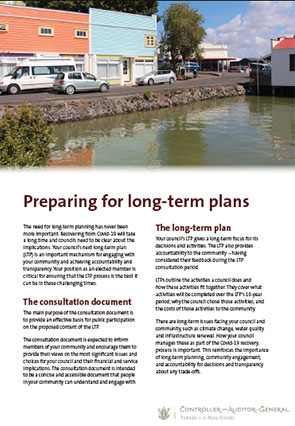Preparing for long-term plans
The need for long-term planning has never been more important. Recovering from Covid-19 will take a long time and councils need to be clear about the implications. Your council’s next long-term plan (LTP) is an important mechanism for engaging with your community and achieving accountability and transparency. Your position as an elected member is critical for ensuring that the LTP process is the best it can be in these challenging times.
The consultation document
The main purpose of the consultation document is to provide an effective basis for public participation on the proposed content of the LTP.
The consultation document is expected to inform members of your community and encourage them to provide their views on the most significant issues and choices for your council and their financial and service implications. The consultation document is intended to be a concise and accessible document that people in your community can understand and engage with.
The long-term plan
Your council’s LTP gives a long-term focus for its decisions and activities. The LTP also provides accountability to the community – having considered their feedback during the LTP consultation period.
LTPs outline the activities a council does and how these activities fit together. They cover what activities will be completed over the LTP’s 10-year period, why the council chose those activities, and the costs of those activities to the community.
There are long-term issues facing your council and community, such as climate change, water quality, and infrastructure renewal. How your council manages these as part of the Covid-19 recovery process is important. This reinforces the importance of long-term planning, community engagement, and accountability for decisions and transparency about any trade-offs.
The role of audit
The Local Government Act 2002 requires the Auditor-General to audit the consultation document and the LTP. In both cases, the audit report must cover:
- whether the document gives effect to the purpose set out in the Act; and
- the quality of the information and assumptions underlying the forecast information provided in it.
Our audits provide the community with independent assurance that the documents meet their statutory purposes and are based on good information and assumptions. This adds credibility and acceptance to published information.
Project management and oversight
Preparing an LTP is a significant task that requires careful project planning. There is a lot of information to consider, for example, the current matters facing your local community, the state of your current assets, and future expectations and intentions.
As your council’s elected representative, decisions about the content of the LTP are for you to make. It is therefore important that you have the opportunity to contribute to the content that goes into your council’s LTP. You should be aware of what decisions you will be expected to make and at what point during the LTP process you will need to make them.
We provide some questions for elected members to consider about oversight of the LTP project.
Some questions for elected members to consider
- Are you receiving regular progress reports on the LTP planning process?
- Are you able to provide guidance and input into the LTP planning process?
- Do council staff have clearly defined roles and responsibilities in the preparation of important LTP documents?
- Are you comfortable with the proposed process and time frame for final decision-making for the LTP?
- Are you satisfied that the proposed LTP consultation process will be effective, reach all parts of your community, and ensure that community feedback is captured and reported to you?
- Are you able to provide guidance and input into significant challenges and judgements your council is facing?

